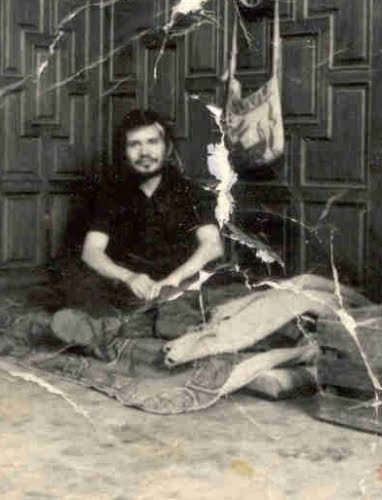La Ratona Cartonera, a small Mexican publishing group, has been working on several translations of poetry by Mario Santiago Papasquiaro. (See my translation of an interview with MSP here.) Their translation of the 538-line poem Advice from a disciple of Marx to a fan of Heidegger is available for $15, which includes shipping and a one-of-a-kind homemade cover:

The proceeds from these will help fund La Ratona's next MSP translation. If you want one, send me an e-mail (
 ) or comment here with your e-mail address. Then I will send you my friend Laura Darling's e-mail address, which you can use to contact her and pay for the book via PayPal.
) or comment here with your e-mail address. Then I will send you my friend Laura Darling's e-mail address, which you can use to contact her and pay for the book via PayPal.Laura was kind enough to give me permission to post an excerpt from the translation:
Mario Santiago Papasquiaro
Advice from a disciple of Marx to a fan of Heidegger
To Roberto Bolano & Kyra Galvan comrades & poets
for Claudia Kerik & my good fortune at having known her"...it's as well at times
To be reminded that nothing is lovely,
Not even in poetry, which is not the case."
W.H. Auden
The world comes to you in fragments / in splinters:
in a melancholy face you glimpse a brushstroke by Dürer
in someone happy the grimace of an amateur clown
in a tree: the tremble of birds sucking on its nape
in a flaming summer you catch pieces of the universe licking their faces
the moment in which an indescribable girl
tears her Oaxacan camisole
exactly next to the half-moon sweat of her armpits
& beyond the peel is the pulp / & like a strange gift of the eye
the eyelash
Maybe not even carbon dating will be able to reconstruct
the true facts
These are not the times in which a naturalist painter
ruminates on lunchtime excesses
between Swedish gymnastic movements
& without losing sight of the pinkish-blue hues of flowers he hadn't
guessed at not even in his sweetest nightmares
We are actors of infinite acts
& not precisely under the blue tongue
of cinematographic lights
for instance today / you see how Antonioni passes by
with his customary camera
observed by those who prefer to bury their heads in the grass
to get drunk on smog or whatever / so they don't add
to the scandals
that already make public roads impassable
by those who've been born to be kissed at length by the sun
& its daily ambassadors
by those who speak of fabulous coitus /of females unbelievable
in this geological age
of vibrations that would've made you a tenacious propagandist of Zen
Buddhism
by those who have once been saved
from the kind of accidents that the crime rags call substantial
& who by the way are not--for now--counted among the flowers of the
Absurd




 Le Retour du Berger, Charles Jacque (1879-1959)
Le Retour du Berger, Charles Jacque (1879-1959)

 Le Porcher, Charles Joshua Chaplin (1825-1891)
Le Porcher, Charles Joshua Chaplin (1825-1891)












